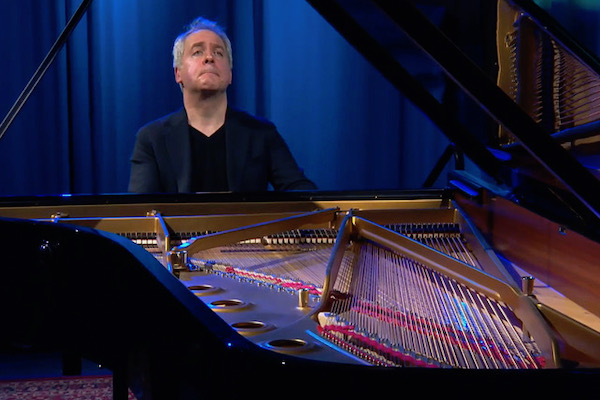Concert Review: Pianist Jeremy Denk’s “Well-Tempered Clavier” — An Embarrassment of Riches
By Susan Miron
I have heard many recordings of Bach’s work, but none had the vibrancy of what I heard in Jeremy Denk’s Sunday concert.

Jeremy Denk performing in WGBH’s Calderwood Hall on Sunday. Photo: Courtesy of Celebrity Series of Boston
“Turn it, and turn it, for everything is in it” runs a famous description of the Babylonian Talmud. It might also be an apt description of J.S. Bach’s wondrous two-volume The Well-Tempered Clavier, sometimes referred to as “The 48” because each book contains 24 preludes and fugues.
The superb pianist Jeremy Denk (who performed Book I twice last weekend in WGBH’s Calderwood Hall) has been living with these preludes and fugues for a long time, and it shows. A famed blog writer, he has just published a courageously candid memoir Every Good Boy Does Fine: A Love Story, in Music Lessons, a musical Bildungsroman that details 20 years of his life, his music teachers, and the start of his career. Denk has a lot of excellent YouTube offerings, including some recent interviews (a very good one with composer Jake Heggie) and a gorgeous Brahms Intermezzo (Op. 119, No. 1 in B minor). A prelude he plays when he talks about The Well-Tempered Clavier Greatest Hits on YouTube is also well worth a listen.
Before Sunday, I remembered Denk as the pianist featured in two of the most memorable concerts I have ever heard: Charles Ives’s complete violin sonatas with Stephan Jackiw (2018) and a performance by the Bell-Isserlis-Denk Trio (2019). Both were presented by the Celebrity Series of Boston, as was this concert. I also knew that he was a brainy humorist whose delightful blog think/denk: the glamorous life and thoughts of a concert pianist has provided entertainment for many. Denk’s list of awards, which include a MacArthur “Genius” fellowship, the Avery Fisher Prize, and Musical America’s Instrumentalist of the Year Award, are the stuff of most musicians’ wildest dreams.
Many competitions, auditions, and concert programs feature one or two of Bach’s 48 preludes and fugues, but hearing live performances of the entirety of Book I or II of Well-Tempered Clavier (written about 20 years apart) is an extraordinarily rare privilege. Denk has been touring with Book I for a few years, and on Sunday (there was also a concert on Saturday night) the smallish hall was packed with mesmerized Denk admirers. He briefly spoke with his customary charm about the composition: “Writing a program note for this landmark of music is like blurbing the Bible.” I would hastily add that writing about them in a brief review is equally challenging. The program notes pithily explain that “The Well-Tempered Clavier includes paired preludes and fugues in all twelve major keys and all twelve minor keys. Beginning with a prelude in C major, Bach moves up the chromatic scale, alternating between major and minor (i.e., C major-C minor-C# major-C# minor, etc.) until concluding with the B-minor fugue.” To this clinical description, Denk added a lyrical appreciation: “omens of turning are for me the core of the Well-Tempered Clavier. They give the feeling of a fabric, reversible, invertible turned inside out and back like a Mobius strip, and unending emotional richness. It is beautiful that Bach belies the premise of his own masterpiece. On the page he divides the world into major and minor. But in the music, he murmurs to us: no. It’s always both.”
The Preludes swerve from the frolicking and joyous to the maniacally energetic and then turn melancholy to the point of piercing heartbreak. I have heard many recordings of this work, but none had the vibrancy of what I heard in Denk’s Sunday concert. (I am convinced I would have appreciated this concert almost as much if I hadn’t just missed two years of live concerts.) Thus the smallish hall’s spellbound audience members were taken on a Bach journey many would not soon forget. I first heard Denk play Bach’s Goldberg Variations live a decade ago, a piece that nowadays has become a rite of passage for more and more pianists. Although his recording of that composition was a great success, I don’t recall the stunning variety of colors, the gradations of mood, sound, and articulation that he displayed performing Book I of Well-Tempered Clavier on Sunday. He has an unusually articulate left hand, and throughout the 24 fugues the lower voices sounded with consistent clarity, imagination, and beauty. I have never been a big fan of fugues, but now I want to hear them again as soon as possible. May Denk record Well-Tempered Clavier. Soon.
Susan Miron, a harpist, has been a book reviewer for over 30 years for a large variety of literary publications and newspapers. Her fields of expertise were East and Central European, Irish, and Israeli literature. Susan covers classical music for the Arts Fuse and the Boston Musical Intelligencer.
